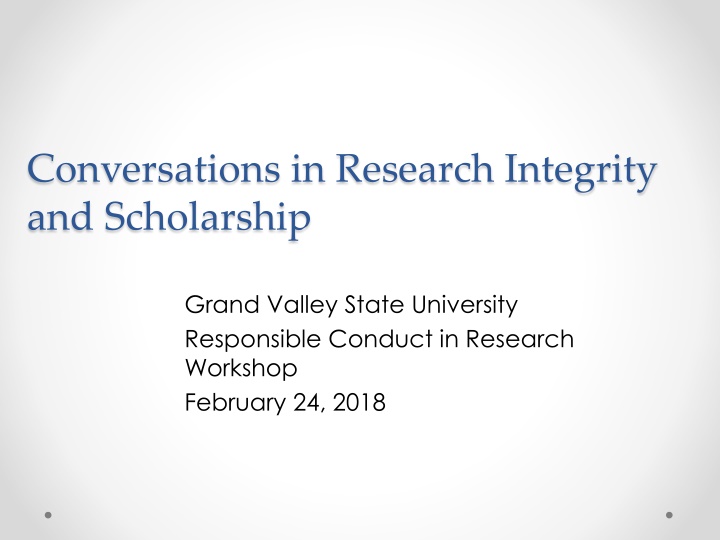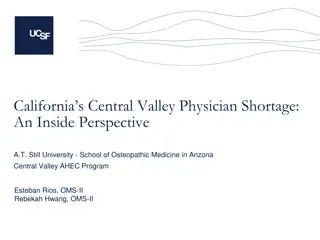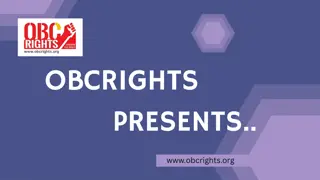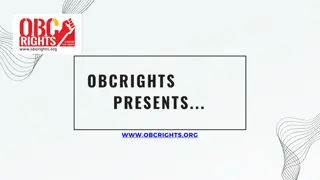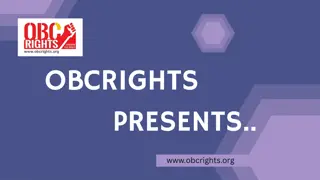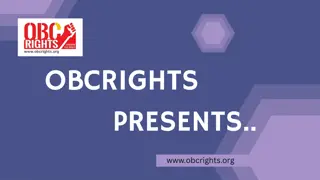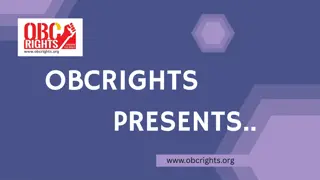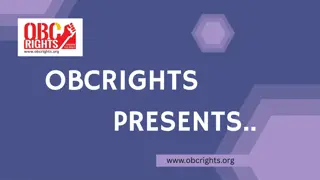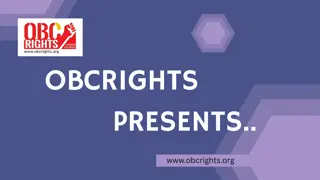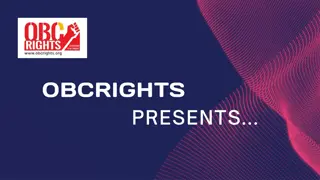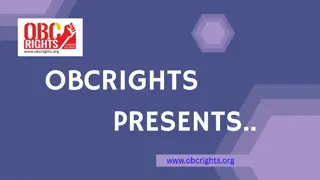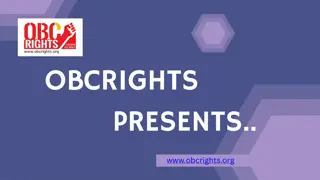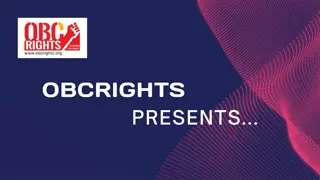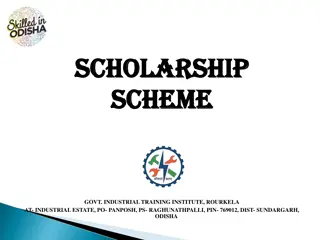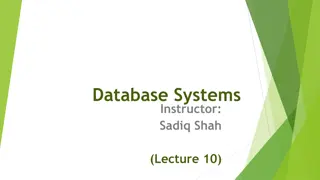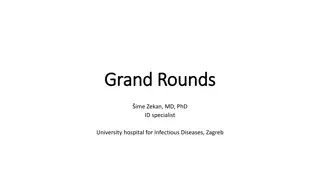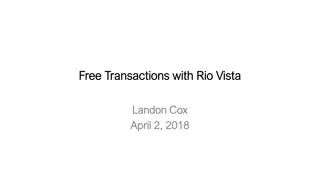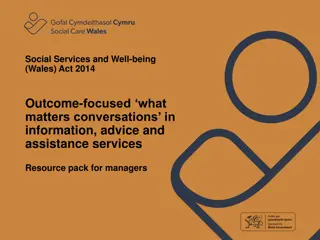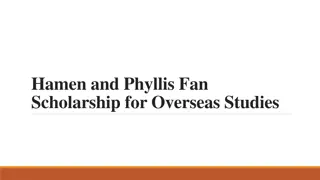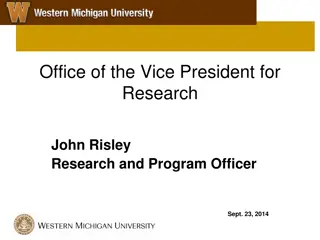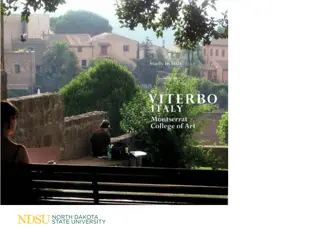Conversations in Research Integrity and Scholarship at Grand Valley State University
In this workshop held on February 24, 2018, experts discussed Responsible Conduct in Research, spanning topics such as Research Subjects, Integrity, Environmental Health, Safety, and Fiscal Accountability. National funding agencies like NSF and NIH also mandate RCR training for grantees, emphasizing ethical research practices and integrity. The event featured key figures from various academic departments and institutions, shedding light on the importance of maintaining scientific integrity. This comprehensive overview delves into essential concepts in conducting ethical and responsible research according to established guidelines and regulations.
Download Presentation

Please find below an Image/Link to download the presentation.
The content on the website is provided AS IS for your information and personal use only. It may not be sold, licensed, or shared on other websites without obtaining consent from the author.If you encounter any issues during the download, it is possible that the publisher has removed the file from their server.
You are allowed to download the files provided on this website for personal or commercial use, subject to the condition that they are used lawfully. All files are the property of their respective owners.
The content on the website is provided AS IS for your information and personal use only. It may not be sold, licensed, or shared on other websites without obtaining consent from the author.
E N D
Presentation Transcript
Conversations in Research Integrity and Scholarship Grand Valley State University Responsible Conduct in Research Workshop February 24, 2018
RCR Advisory Board https://www.gvsu.edu/rcr/ Glenn Valdez, Ph.D. Psychology Department College of Liberal Arts &Sciences David Stark, Ph.D. History Department College of College of Liberal Arts & Sciences Susan Mendoza, Ph.D. Director of Undergraduate Research &Scholarship Blake Ashby, Ph.D. College of Engineering Robert Smart, Ph.D. Vice Provost, Research Adm inistration Executive Director, Center for Scholarly & Creative Excellence Martina Reinhold, Ph.D. Physician s Assistant Studies College of Health Professions Stacy Gardner Research Compliance Specialist Benjamin Vesper Research Compliance Specialist
National Science Foundation Effective January 4, 2010 "In accordance with Section 7009 of the America Creating Opportunities to Meaningfully Promote Excellence in Technology, Education, and Science (COMPETES) Act (42 U.S.C. 18620-1) NSF requires that grantees must have a plan in place to provide appropriate training and oversight in the responsible and ethical conduct of research (RCR) to undergraduates, graduate students, and postdoctoral researchers who will be supported by NSF to conduct research. Training plans are subject to review, upon request.
National Institutes of Health "NIH requires that all trainees, fellows, participants, and scholars receiving support through any NIH training, career development award (individual or institutional), research education grant, and dissertation research grant must receive instruction in responsible conduct of research. This policy will take effect with all new and renewal applications submitted on or after January 25, 2010, and for all continuation (Type 5) applications with deadlines on or after January 1, 2011. This Notice applies to the following programs: 043, 071, F05, F30, F31, F32, F33, F34, F37, F38, K01, K02, K05, K07, K08, K12, K18, K22, K23, K24, K25, K26, K30, K99/ROO, KL1, KL2, R25, R36, T15, T32, T34, T35, T36, T37, T90/R90, TL1, TU2, and U2R. This policy also applies to any other NIH-funded programs supporting research training, career development, or research education that require instruction in responsible conduct of research as stated in the relevant funding opportunity announcements.
What is Responsible Conduct in Research (RCR)? Research Subjects Research Integrity Environmental Health and Safety Fiscal Accountability Macrina, F. L. (2005). Scientific integrity: Text and cases in responsible conduct of research. Washington, D.C: ASM Press
Areas of RCR Training Research Misconduct Conflict of Interest, Commitment and Conscience Human Subjects Animal Welfare Laboratory Safety Data Acquisition, Management, Sharing and Ownership Responsibility to Society Publication Practices, Responsible Authorship and Peer Review Collaboration Mentor/Trainee Responsibilities
RCR Policy at GVSU Completion of one of the following fulfills GVSU requirements for RCR certification for three years: The Epigeum Full RCR Online Course The University-Sponsored One-Day Intensive RCR Workshop Attendance of at least eight Research Ethics Conversations in one year An RCR-certified, discipline-specific course or interdisciplinary program
RCR Policy at GVSU NSF and NIH funded Principal Investigators are responsible for ensuring completion of the RCR education requirements by all staff, graduate students, and undergraduate students who are supported by their projects.
RCR Policy at GVSU Each graduate student must complete RCR training prior to completion of 50% of the graduate program or prior to engaging in any research activity (e.g. voluntary, independent, or supervised research, projects, theses, and dissertations). The following options are available: The Epigeum Full RCR Online Course The University-Sponsored One-Day Intensive RCR Workshop Attendance of at least eight Research Ethics Conversations in one year An RCR-certified, discipline-specific course or interdisciplinary program. Individual graduate programs must identify what type of minimal RCR training is required and when it will be required, with approval by the Dean of the Graduate School. Additional RCR training may be required by individual programs. See Graduate School RCR Training Policy for further details
RCR Policy at GVSU NIH Funded Investigators, Trainees, and Participants funded through the following programs: 043, 071, F05, F30, F31, F32, F33, F34, F37, F38, K01, K02, K05, K07, K08, K12, K18, K22, K23, K24, K25, K26, K30, K99/ROO, KL1, KL2, R25, R36, T15, T32, T34, T35, T36, T37, T90/R90, TL1, TU2, and U2R. Instruction should include face-to-face discussions. A minimum of 8 contact hours is considered to be substantive, and may be achieved through completion of one of the following: The University-Sponsored One-Day Intensive RCR Workshop Attendance of at least eight Research Ethics Conversations in one year An RCR certified discipline-specific course or interdisciplinary program
RCR Policy at GVSU All faculty are required to complete the Epigeum RCR Concise Course for Experienced Researchers (45-minute Core Course). Faculty and staff who have internal funding (e.g., GVSU R&D grants) are required to complete the Epigeum RCR Concise Course prior to the release of funds.
What is Research Misconduct? Fabrication Falsification Plagiarism OSTP Federal Policy on Research Misconduct (2005)
What is Research Misconduct? Prior to 2000 Fabrication Falsification Plagiarism Other serious deviations from accepted practices
American Geophysical Union We affirm that discrimination, harassment (including sexual harassment), or bullying in any scientific or learning environment is unacceptable, and constitutes scientific misconduct under the AGU Scientific Integrity and Professional Ethics Policy. AGU Scientific Integrity and Professional Ethics Policy, August 2017
Science Suffers From Harassment Science is not being done outside of interpersonal interactions, says anthropologist Robin Nelson of Santa Clara University, a co-author on the two recent studies that looked at harassment in the field. Behavior that silences other voices subverts the entire scientific enterprise. Scientific American, January 24, 2018
Clancy KB, Nelson RG, Rutherford JN, Hinde K. Survey of academic field experiences (SAFE): trainees report harassment and assault. PLoS One. 2014 Jul 16;9(7):e102172.
NSF Notice on Harassment NSF has developed a new award term and condition that will require grantee organizations to report findings of sexual harassment, or any other kind of harassment regarding a PI or co/PI or any other grant personnel. The award term and condition also will require the grantee to report the placement of the PI or co-PI on administrative leave relating to a harassment finding or investigation. This term and condition will make it clear that NSF may take unilateral action as necessary to protect the safety of all grant personnel, to include suspending or terminating an award or requiring the grantee to replace or remove personnel. National Science Foundation Important Notice No. 144
Discussion 1. Should Other serious deviations from accepted practices be associated with the definition of research misconduct? 2. What other topics would you like to see covered by RCR training at GVSU?
